
Multiple hats, corporate angst, and AI anxiety were the themes of Jacobs Media’s annual air talent survey, dubbed AQ6. It was a packed house at the Hard Rock Hotel in San Diego for the first day of Morning Show Bootcamp as Fred Jacobs revealed the findings.
The survey, which included 489 employed talents, personalities, and producers alongside 59 recently unemployed, provides a snapshot of the industry’s current state and the sentiments of those who give it a voice.
The demographic breakdown of on-air talent remains largely unchanged, with nearly 90% of respondents identifying as white and a male to female ratio of 71% to 27%. Despite the growing diversity among younger talents, the percentage of women has not shifted in three years, highlighting an ongoing issue with gender imbalance in radio.
While 40% of male AQ6 respondents believe women have equal opportunities for advancement, only 27% of women agree. On a more positive note, the primary motivation for many on-air talents, especially women, remains community service.
Job stress is escalating, with talents now typically juggling almost three roles, and a third of respondents handling four or more. Younger individuals report higher stress levels, and over 40% of talents feel that achieving a work-life balance is currently out of reach. Voicetracking continues to be a significant part of radio operations, with one in three talents primarily using this method. Six in ten talents are involved in creating social media or web content daily, indicating a shift towards digital engagement.
A prevalent concern among AQ6 respondents is the perceived lack of investment in talent development by radio companies, which may be contributing to the professional stagnation within the industry. Only 29% of talents report that their shows have been actively marketed in the past year, primarily those in medium-sized companies. Financial instability is on the rise, with 42% of respondents now struggling with debt, up from 31% in 2021.
The sentiment towards radio companies has deteriorated, with 83% of talent feeling taken for granted. Fears regarding job security due to AI advancements persist, with 77% worried about potential job loss, though there is a growing acknowledgment of AI’s benefits in enhancing efficiency and personal branding.
Despite reservations, nearly three in ten talents are utilizing AI weekly, particularly Millennials. There’s a split in opinion about the use of AI-generated voices; while half view it negatively, 20% would willingly lend their voice to such projects if compensated.
Confidence in radio as a lifelong career is dwindling. Only 51% of Millennials see themselves finishing their careers in the industry, and a mere 18% of all talents would recommend radio as a career to young people.










Women generally don’t sound good on the radio. Ignoring the psychology of listeners is why radio is where it is. We don’t need to force female voices on the air when most P1s don’t want to hear them.
Jacobs is such a bore. This industry listens to the same flatline voices predicting the same thing over and over again… much like the bad Top 40 song. Radio also uses the same 5 imaging voices for several hundred stations across the country. If you program your stations based out of fear, this is the result you get. If you staff your stations based on approval from other radio dorks rather than real listeners, this is what you get. If you voice track half your staff and expect an authentic connection to your audience, this is what you receive– nothing but financial debt, bad ratings, and 11 cents a share on the stock market. Stop tap dancing for the burnt out radio person across the street for their approval — it’s not working. Stop thinking social media will save you, and get back to real radio. You tossed aside the one thing that makes radio unique and knee jerk reacted to every little shift in the wind. It didn’t work. No big name in the industry with a tired panel or music research test can help… you need to hit the streets, connect with the community or you will continue to lose.
There are too many situations where the job description isn’t spelled out clearly – because of the top-heavy culture of corporations. These days the music is imported, much of the talent is imported and the local people have to not ask questions but follow the marching orders. God forbid someone on a local level wants to do something creative. It has to be okayed by 14 people at the top before its even considered. It seems easier to just do the national contest, play the national playlist and have the national jock jump in 4 times an hour with the latest on Taylor Swift. Don’t forget “this report brought to you by”…attached to nothing. Generic weather reports sometimes days old and traffic reports as stimulating as someone reading the menu from Jack In The Box. In many cases someone local comes up with an idea and has to go through 15 hoops to get approval because everyone up the chain is trying to cover their behinds. Maybe this is where AI can help save broadcasting. That is if AI can develop more common sense than the big shots.
I know a woman who blamed inequality when she got fired. When re-hired by another company, she said that radio finally turned the corner. See, these small surveys only capture the individuals current situation. Make 150k, then radio is pretty good. Just took your 3rd payout in 2 years and the PD says to just be quiet and play music, then the sky is falling.
Also, for all of these articles and surveys, it’s obvious that the companies aren’t listening. Be relatable, organic, local… etc…. too many parrots. Probably why 99% of these articles get 0 comments. Zero. It’s hard to do 99% of anything, all the time.
Spot on! thank you for stating this!!